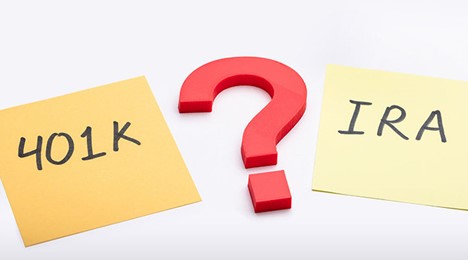What to Do with that Old 401(k)

Written by: Vincenzo Testa, CPA, CFP®, ECA
When it comes to managing your retirement savings, one critical decision you might face is what to do with your 401(k) when you leave a job. Often, individuals are presented with the option to roll over their 401(k) into an Individual Retirement Account (IRA). This choice can have significant implications for your financial future. In this blog, we'll explore why rolling your 401(k) into an IRA could be a smart move and what factors you should consider before making this decision.
Benefits:
- More Investment Choices
- Lower Fees
- Simplified Management
- More Control Over Withdrawals
- Estate Planning Benefits
Understanding the Basics
Before diving into the reasons for rolling over your 401(k) into an IRA, let's clarify the basics of each retirement account type:
401(k): This is an employer-sponsored retirement account where contributions are typically made pre-tax. Employers may match a portion of your contributions, and the investments are limited to what is offered by the plan.
IRA (Individual Retirement Account): This is a personal retirement account that you open and manage independently. IRAs can be either traditional (pre-tax contributions, tax-deferred growth) or Roth (after-tax contributions, tax-free growth).

Reasons to Roll Over Your 401(k) to an IRA
- More Investment Choices
One of the most significant advantages of an IRA over a 401(k) is the expanded range of investment options. While 401(k) plans restrict you to a set menu of investments chosen by your employer, IRAs offer a much broader selection. This can include individual stocks, bonds, ETFs (Exchange-Traded Funds), mutual funds, and even alternative investments like real estate investment trusts (REITs) or commodities. The ability to diversify your portfolio more extensively can potentially enhance your returns and better align with your risk tolerance and investment goals.
- Lower Fees
401(k) plans often come with administrative fees, investment fees, and management fees that can eat into your returns over time. By rolling over into an IRA, you gain the flexibility to choose low-cost investment options and potentially reduce overall fees. Many IRAs offer commission-free trades on a variety of investments, and you can shop around for providers offering competitive fee structures that suit your needs.
The chart below is from a third-party firm that administers plans and keeps records. The amounts below are based on a total contribution of $3,207.70 for the quarter. This means the investor is paying $44.91 in fees on a principal of $3,207.70. (That’s 1.4%.)
| Expenses | |
| Administrative Fees | $25.00 |
| Investment Fees | $4.35 |
| Asset/Revenue Sharing | $2.31 |
| Audit, Fiduciary & Consulting | $13.25 |
| TOTAL | $44.91 |
The difference in these percentage points might seem small initially, but it can accumulate significantly over time. Consider three friends: Ashley, Joseph, and Alan, who each invest $100,000 in a mutual fund at age 35. All three accounts earn an annual return of 8%, but the fees differ: 1%, 2%, and 3% annually. By age 65, Alan, who paid a 3% fee, ends up with $432,194. Joseph, with a 2% fee, has $574,349. Ashley, who paid only a 1% fee, is the biggest winner with $761,225 saved for retirement.
- Simplified Management
Consolidating retirement savings into a single IRA can simplify your financial life. Instead of managing multiple 401(k) accounts from previous employers, you can streamline your investments into one IRA account. This makes it easier to track performance, adjust your asset allocation as needed, and stay organized with your retirement planning.
- More Control Over Withdrawals
IRAs typically offer more flexibility when it comes to withdrawals compared to 401(k) plans. With a traditional IRA, you can start withdrawing funds penalty-free after age 59½, and with a Roth IRA, you can withdraw contributions (not earnings) at any time penalty-free. This greater control can be advantageous for managing your income in retirement and adapting to unforeseen financial needs.
- Estate Planning Benefits
IRAs often provide more robust estate planning options compared to 401(k) plans. You can designate beneficiaries directly through your IRA paperwork, which can simplify the inheritance process for your loved ones and potentially provide tax advantages depending on their circumstances.
Conclusion
Deciding whether to roll your 401(k) into an IRA is a personal choice that depends on your individual financial situation and retirement goals. For many individuals, the increased investment options, potential cost savings, and flexibility make an IRA an attractive option. However, it's essential to weigh the pros and cons carefully and consider seeking advice from a financial professional to ensure the decision aligns with your long-term financial plan.
By understanding the benefits and implications of rolling over your 401(k) into an IRA, you can make an informed choice that best supports your path toward a secure and comfortable retirement. Remember, every individual's financial journey is unique, so take the time to assess what option aligns best with your goals and aspirations for the future. If you have questions on your specific situation please contact our office to speak with a trusted advisor.
Bouchey Financial Group has offices in Saratoga Springs and Historic Downtown Troy, NY as well as Boston, MA and Jupiter, FL.